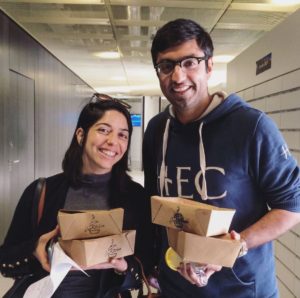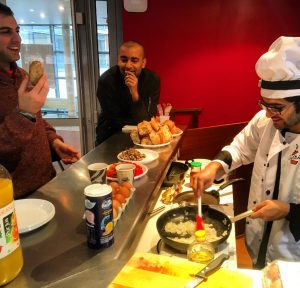If there’s one thing on-campus students crave, it’s a home-cooked meal. Preferably one prepared by someone else–someone who actually has time to cook–and who knows the flavors of their homeland.

Shir and Siddharth making a delivery
That’s why three HEC Paris MBA students—Siddharth Gurnani, Varad Deshpande and Shir Sheftel—created Our Kitchen, an online marketplace that connects home cooks with hungry customers at HEC Paris. The food-sharing platform has already had 165 eager customers subscribe since its January launch. Members log in, choose a mealtime and meal, then anticipate the delivery of tasty, exotic dishes such as Korean Bibimbap spiced with gochujang sauce and hot Aaloo Paratha (stuffed Indian bread) served with melted butter.
The startup builds upon an idea that started several years ago within the MBA, in which partners of students occasionally sell homemade lunches. “I participated in one of those events, and everyone wanted to try the food,” Siddharth says. “We started brainstorming, and decided to expand on the idea of just cooking and selling food. We decided to create a platform and work toward a much bigger solution. We’re at a business school, after all, and we have a really good test market, so we went for it.”

Varad serves up an egg breakfast in Expansiel
The co-founders each agreed to kick-in a small amount of money—just enough to create the marketing materials and launch the website—then contacted people they knew who shared their passion for cooking. On the advice of the HEC Entrepreneurship Center, they decided to release the platform quickly, to discover if there was really a market for their product.
One of the benefits of launching a campus-based startup is the freedom to experiment. Siddarth explains that the project is a pilot, a learning-by-doing experience which, if successful, the co-founders plan to continue after graduation on a much larger scale. “We want to understand what the true pain points are when it comes to cooking,” he says. “What would prevent someone who knows how to cook, who likes to cook, from taking the step of selling their dishes online: Is it prep, is it delivery, or are there other logistical issues like grocery shopping? That’s what we’ve set out to discover.”
No matter the final outcome, the startup has already found its success in the stomachs of hungry students. Nearly 600 meals have been sold through the meal-sharing platform since the beginning of the year.
Recent Comments